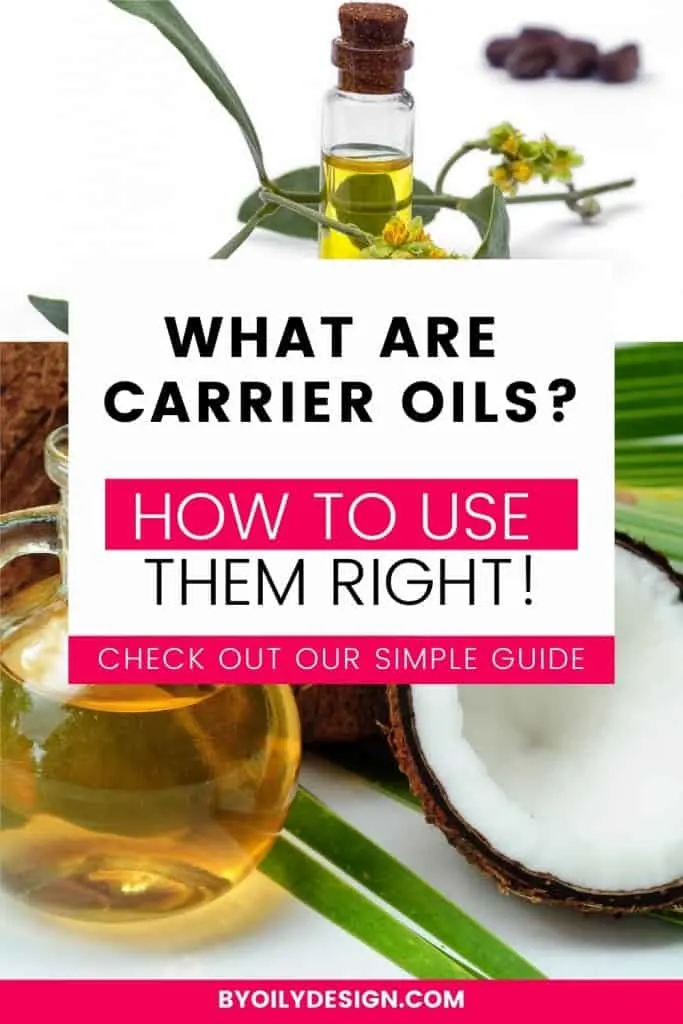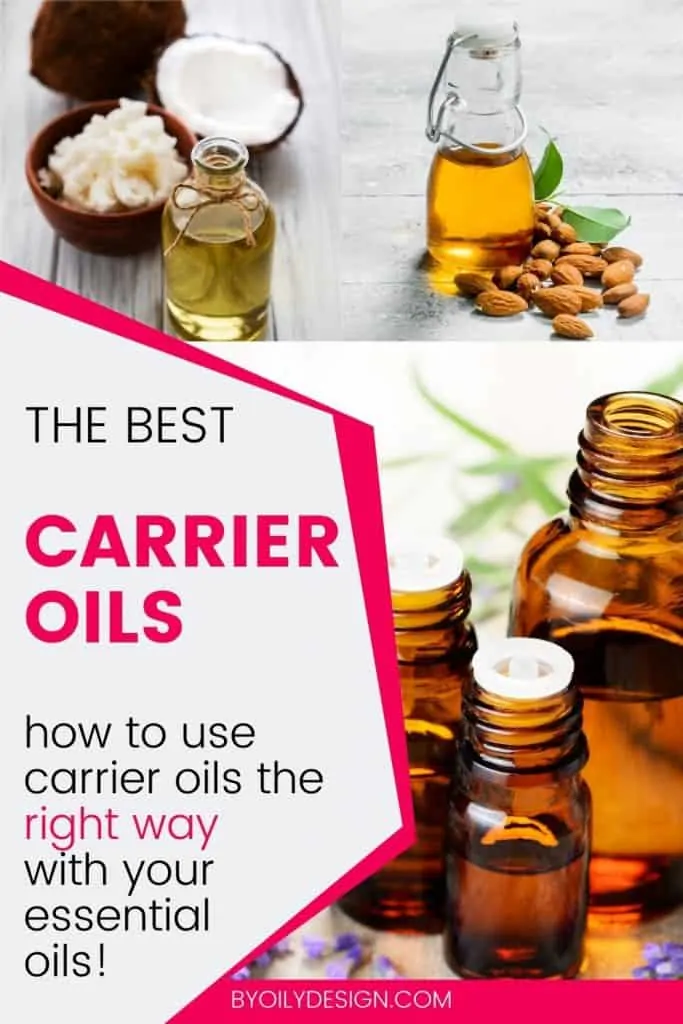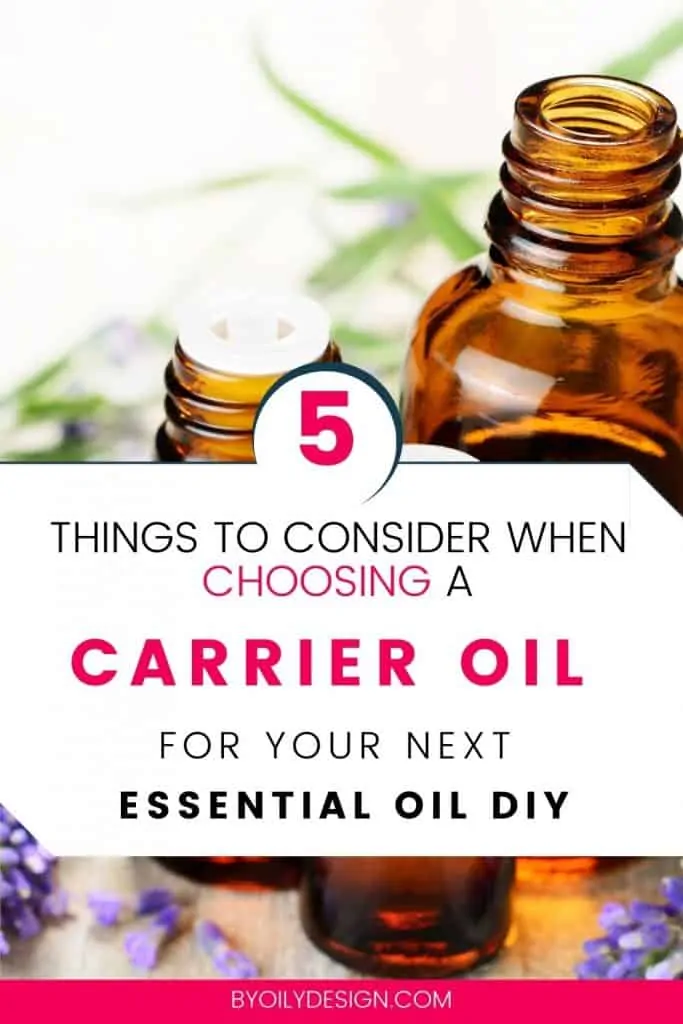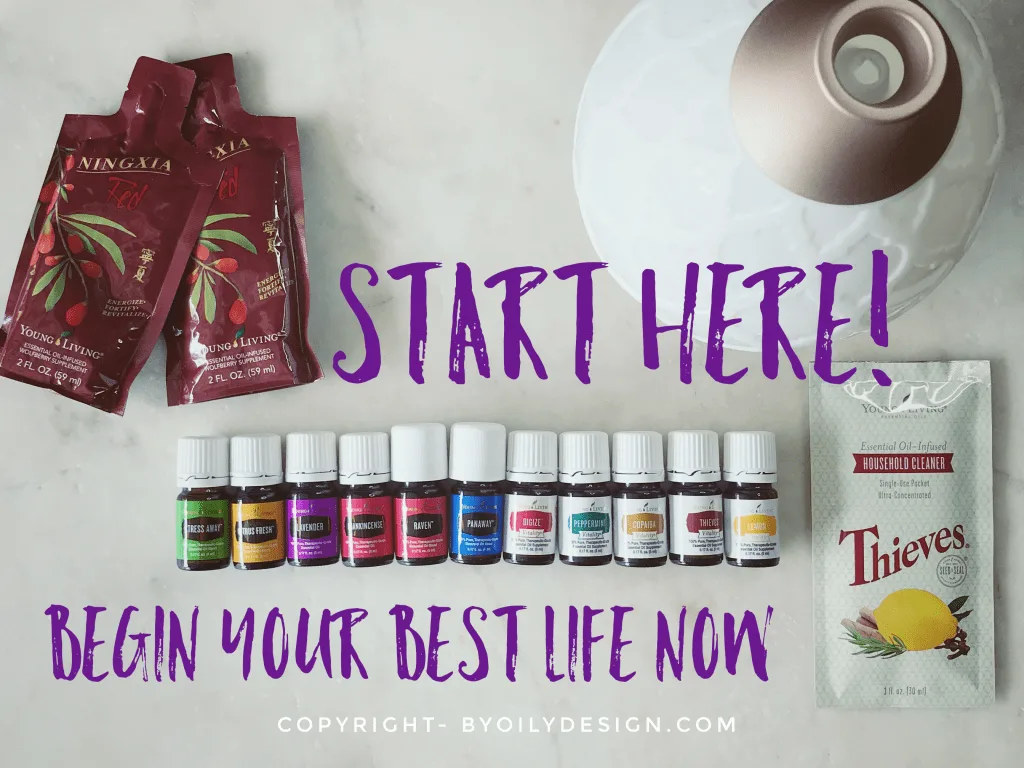You can use essential oils in several ways, but one of the most important ways is to use them topically. And this is where carrier oils, the heavy lifters of the essential oil world, come into focus.
What is a carrier oil?
Carrier oils are essentially the base oils that you dilute essential oils in before applying them on your skin. Essential oils are too potent to be applied to the skin directly.
The other benefit of diluting essential oils with carrier oils is that carrier oils do not evaporate from the skin surface quickly and remain fixed on the skin. Probably the reason why they are also known as ‘fixed oils.’
Carrier oils are also called vegetable oils, though they are also extracted from seeds, kernels, or nuts of different plants.

*This post contains affiliate links to the essential oils and other products I talk about in the post. Purchasing them here from my blog is no extra cost to you but I do earn a commission that helps in the cost of running this blog. Thanks for your support!
Types of carrier oils
There are several different types of carrier oils available. If you are new to the world of essential oils, looking for the right carrier oil to use with your essential oil can be quite confusing. Most carrier oils can be used with any essential oil; however, you must consider certain things before choosing one. These include –
- Odor – Most carrier oils do not have a powerful odor, but a few have a distinct smell. They may change the aroma of the essential oil when added to it.
- Absorption – Certain essential oils are more easily absorbed by the skin than others. If you plan to use any essential oil for massage, make sure you dilute it with a carrier oil that can be easily absorbed.
- Skin type – Choose a carrier oil that is the most suitable for your skin type.
- Shelf life – Some carrier oils can be stored for a longer duration, while others may go rancid very soon. Use a carrier oil depending on the frequency of your usage.
- Purity – It is best to use a carrier oil that is 100% pure. Pure oils are more easily dissolved, and they will provide the benefit you desire.
Best carrier oils
Carrier oils contain vitamins, minerals, antioxidants, and several other nutrients that can improve your skin and hair. They help reduce dryness and soothe irritation. Besides adding moisture to the skin, carrier oils also help in brightening dull complexions, reducing age spots, improving hair growth, and improving skin elasticity.
Here are some of the best carrier oils –
Carrier oils for skin
1. Sunflower oil
Sunflower oil is cold-pressed from the seeds of the sunflower. It is highly absorbent and doesn’t clog pores. People with all skin types (dry, oily, combination) can use it. It softens the skin, prevents moisture loss, and facilitates skin regeneration.
Sunflower oil is rich in vitamins A, B, D, and E, minerals, lecithin, and unsaturated fatty acids. It can be used for massage as well as aromatherapy.
2. Coconut oil
Organic virgin coconut oil is rich in vitamin E, antioxidants, and natural fatty acids, which makes it a suitable carrier oil for the skin. It helps get rid of cellulite, stretch marks, and keeps the skin moisturized.
Coconut oil has high saturated fat content, which makes this oil ideal for protecting the skin. It remains solid at room temperature but quickly melts when applied. Coconut oil has a long shelf life.
Make sure you buy unrefined coconut oil, which has not gone through chemical extraction.
3. Jojoba oil
Jojoba oil can be used for all kinds of skin types. It is rich in fatty acids, antioxidants, and vitamin E. As a result, Jojoba moisturizes the skin without leaving a heavy residue or clogging the pores. It is odorless and golden yellow in color. It is very similar to the oil that the skin produces naturally.
4. Evening primrose oil
The evening primrose oil is extracted from the seeds of the evening primrose plant. The oil contains omega-6 fatty acids, linoleic acid, and polyphenols. It helps to smoothen the skin and improve its elasticity and firmness. It is also helpful to those who have dry and itchy skin. Primrose is usually expensive and can go rancid quickly.
5. Grapeseed oil
Grapeseed oil is made by extracting from the seeds of particular grape varieties. It is packed with antioxidants and it also contains vitamin C. Making it a good massage oil, and it leaves a glossy layer on the skin. It has a light and sweet aroma.
These carrier oils can be mixed with essential oils that are highly beneficial for the skin. Here are some examples of essential oils that you can use for different skin types –
Essential oils for dry skin support
- Lavender
- Chamomile
- Sandalwood
Essential oils for oily skin support
- Clary Sage
- Rosemary
- Frankincense
- Geranium
- Neroli
Essential oils for sensitive skin support
- Lavender
- Frankincense
- Sandalwood

Best carrier oils for hair
Carrier oils and natural and nourishing and can work wonders for your hair. These are some of the best carrier oils for hair –
1. Coconut oil
Coconut oil contains several vitamins and minerals that are great for hair health. It helps to repair dry, damaged, and brittle hair with split ends. It also adds a beautiful, healthy shine to your hair.
2. Argan oil
Argan is extracted from the nuts of the Argan trees. It is rich in fatty acids, antioxidants, and vitamin E, and it helps to protect your hair from damage by the UV rays and heat. Argan is also great for people whose hair tends to get greasy. It works well as an anti fizz treatment.
3. Jojoba oil
Jojoba oil shares many qualities with sebum, the oil that our scalp produces naturally. This oil is a great hair moisturizer and works well to repair dull, dry, and damaged hair. You can apply it to your scalp and keep it on for a few minutes before you shampoo your hair.
4. Sweet almond oil
Sweet almond oil contains vitamin E, antioxidants, fatty acids, magnesium, and proteins. Because it contains so many great things, Sweet Almond is the best carrier oil for hair growth. It reduces hair breakage and repairs dull and damaged hair. It also adds shine and luster to your hair.
5. Olive oil
Organic, extra-virgin olive oil for skin has protective and moisturizing properties thanks to its rich antioxidant content. It protects against heat damage, moisturizes the hair, and gives is sleek and shiny look. It contains oleic acid, palmitic acid, and squalene, which have softening qualities.
You can mix some essential oils to these carrier oils for additional benefits for your hair. For instance, here are a few examples of essential oils that help your hair grow and add strength and shine to them –
- Lavender
- Peppermint
- Rosemary
- Cedarwood
- Lemongrass
- Thyme
- Clary sage
- Tea tree
How to use carrier oils?
To use essential oils, you must dilute them in a carrier oil according to the dilution ratio suggested. According to experts, you must use the following dilution ratios for different age groups –
For example, in young children for topical use
0.5 to 1% dilution – Three to six drops of essential oil for one ounce of carrier oil
For adults for topical use
2.5% dilution – 15 drops of essential oil for one ounce of carrier oil
Dilution recommended for adults during aromatherapy
3% dilution – 20 drops of essential oil for one ounce of carrier oil
How to buy carrier oils?
Always buy cold-pressed carrier oils as they are not damaged by heat while processing. Some cheap examples of carrier oils may be treated with heat and may also contain added additives that consequently can cause more harm than good.
A good quality carrier oil will have the name of the species mentioned on it. For example, you will find the words ‘Simmondsia Chinensis ‘mentioned on the bottle of good quality jojoba oil. If you read the word ‘fragrance’ on the bottle, it means there are additives in this oil, and you must not buy such an oil.
Pure cold-pressed oils are labeled as ‘organic,’ cold-pressed,’ and ‘Non-GMO.’ These oils retain their beneficial natural properties and are rich in proteins, vitamins, and minerals.
How to store carrier oils?
Carrier oils have a high-fat content, so they have a limited shelf life. You should store your carrier oils in a cool, dark place, like your refrigerator, to extend shelf life.
Most importantly, it would be best if you keep them in any dark-colored glass bottle.
Can you mix different carrier oils?
The idea of blending or mixing carrier oils to make a lotion, cleanser, or bath oil is not new. Different carrier oils have different consistency, aroma, and absorption capacity. Mixing carrier oils help to combine their properties to make the right product for you.

Frequently asked questions about carrier oils.
Here are the answers to questions you have always wanted to know about carrier oils –
1. What is the best carrier oil to mix with essential oils?
The best carrier oil to mix with essential oils depends on what you want to use it for. If you’re going to use it for moisturizing your skin, jojoba oil and sunflower oil are the best. For example, if you want to use a carrier oil for your hair, then coconut oil and sweet almond oil are good choices.
2. Which is the best carrier oil for tea tree oil?
You can dilute tea tree oil in olive oil, coconut oil, almond oil, and grapeseed oil.
3. Which is the best carrier oil for perfume?
When it comes to making homemade perfumes, jojoba oil is one of the best options. For example, it is odorless and colorless, so it will not affect the fragrance of the essential oil you use. It is quickly absorbed into the skin without making it greasy.
4. Can I use baby oil as a carrier oil?
Baby oil is a mineral oil that is scented with a synthetic fragrance. Therefore, it is not suitable to be used as a carrier oil.
5. Can I use olive oil as a carrier oil?
Extra-virgin olive oil can be used as a carrier oil for aromatherapy and skin care preparations.
6. Which carrier oils do not clog pores?
Argan oil, grapeseed oil, hemp oil, and sunflower seed oil have low comedogenic ratings, which means they have a low likelihood of clogging pores.
7. Can I use Vaseline as a carrier oil?
Petroleum-based products should not be used as carrier oils. They are not a natural product, and you should not use it with essential oils.
8. Which carrier oils are best for aging skin?
Jojoba oil, extra virgin olive oil, castor oil, rosehip oil, and sesame oil are rich in nutrients that have a positive impact on aging skin.
Final thoughts
Carrier oils are used to dilute essential oils so that they can be used on the skin safely. These oils are seeds, kernels, or nuts of different plants. In conclusion, many of these carrier oils have their own beneficial properties that can help improve your skin and hair health when used.
Want to get started using essential oils? I'd love to coach you!
When you sign up with me as your enroller you get amazing support and education.
I even have an FREE Essential oils reference app just for those that enroll with me! I want you loving your oils and getting the most out of them you can.
Ready to get started? Click on the below image and let's get the starter kit in your hands.


Written by Manveen Grewal , Edited by Ruth Rackley
